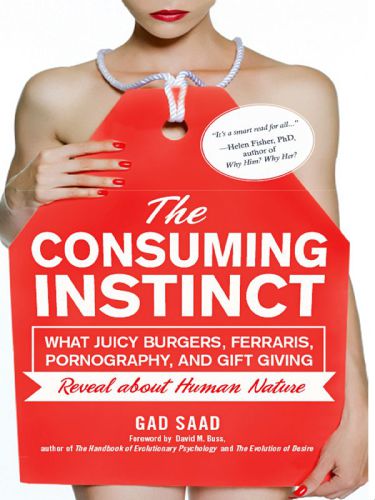
The Consuming Instinct
What Juicy Burgers, Ferraris, Pornography, and Gift Giving Reveal About Human Nature
- اطلاعات
- نقد و بررسی
- دیدگاه کاربران
نقد و بررسی

April 18, 2011
Saad (The Evolutionary Bases of Consumption) argues that consumer preferences aren't only dictated by culture and socialization but also by our biological heritage. We have a "consuming instinct," often motivated by one of the "key Darwinian meta-drives: survival, mating, kin or reciprocity." For example, McDonald's popularity can be understood as an innate preference for fatty, salty, high-caloric food, an adaptation designed to help the species subsist during times of food scarcity. Saad believes that manufacturers can better cater to consumer demands if they design products in line with our biological instincts and, as an example, advocates for a shift toward green architecture and interior design because they appeal to our "innate biophilic needs." The claim that differences between male and female consumer patterns represent innate differences between the sexes might seem like unnecessary theorizing to some readers, and Saad acknowledges these concerns, but believes that recognizing "our shared biological heritage" isn't divisive, and in fact might "unite us within the proverbial global consumer village." Saad's personal approach keeps the book accessible; he uses humor and anecdotes from his own life to reinforce his theory about the biological impulses behind the hundreds of consumer choices we make each day.

June 1, 2011
An evolutionary psychologist goes on a mission to prove that modern-day consumerism is imbedded in our caveman DNA.
Celebrated Psychology Today blogger Saad comes out punching, and the ghost of Charles Darwin just might be in his corner, cheering him on. Accepting that human beings evolved from earlier primates may be hard enough for some, but the author aims for the jugular when he suggests that infidelity might be imbedded in a cheating husband's genes. Like an oncologist trying to understand a cancerous tumor, Saad insists he's only trying to get a handle on what makes humans tick. But viewing the human experience solely through the lens of evolutionary psychology will make many uncomfortable. Corporate giants who spend millions of dollars each year in an attempt to mold and manipulate consumers get a pass. But readers not inclined to view fatty cheeseburgers as savvy insurance policies against times of caloric privation or birthday gifts simply as bids at social reciprocity will want to hit back. Saad's dismissive tone also detracts from the scientific smackdown he delivers; when the author declares that the clinically depressed are the only ones not suffering from the "delusional glow" of self-help books, readers may wonder if Saad isn't getting a little punchy himself.
The "nature versus nurture" debate might not be laid to rest here, but there is plenty to ponder in this provocative read.
(COPYRIGHT (2011) KIRKUS REVIEWS/NIELSEN BUSINESS MEDIA, INC. ALL RIGHTS RESERVED.)

May 1, 2011
Saad (marketing, Concordia Univ.; The Evolutionary Bases of Consumption) provides a fascinating analysis of human behavior based on a creative combination of the newly developing field of evolutionary psychology with the more established sciences of anthropology, cognitive science, and the neurosciences. At the core of evolutionary psychology is the belief that all humans have innate areas in their brains, which have specific knowledge that helps them adapt to local environments. Saad applies these principles to illuminate how human biological heritage influences daily consumption habits, which he maps to four key Darwinian drives: survival (we prefer foods high in calories), reproduction (we use products as sexual signals), kin selection (the exchange of gifts with family members), and reciprocal altruism (we offer gifts to close friends). VERDICT Saad's work will appeal to readers interested in the biological basis of human behavior, the age-old debate of nature versus nurture, and especially what makes consumers tick. The work is clearly essential for marketing professionals, advertisers, and psychologists, but his scholarly style may intimidate lay readers unfamiliar with psychology research and this relatively new field of study.--Dale Farris, Groves, TX
Copyright 2011 Library Journal, LLC Used with permission.

June 1, 2011
Saad weighs in on our compulsion to purchase everything from cars to shoes by suggesting that a consuming instinct has been biologically passed down via evolution. From our obsession with holidays that require gift giving to our birdlike attraction to the more striking aspects of what we buy (he points to boy bands full of good-looking young men who dance), Saad pivots from dropping pop-culture references to exploring academic studies. Variety results in increased food consumption (which explains densely packed menus), kin relationships foster competition (wedding-gift registries), and innate desires to band together to defend the group explain sports rivalries and pricey team paraphernalia. Most provocatively, he asserts that religion is the greatest product ever devised, with the promise of immortality creating lifelong brand loyalty on an unprecedented scale. One of the strongest allures of religion, he writes, is that it plays on our deep-seated Darwinian need to view the world through the us versus them' prism. Covering everything from pornography to Wall Street, this thought-provoking title induces readers to look more deeply at how they live.(Reprinted with permission of Booklist, copyright 2011, American Library Association.)




دیدگاه کاربران